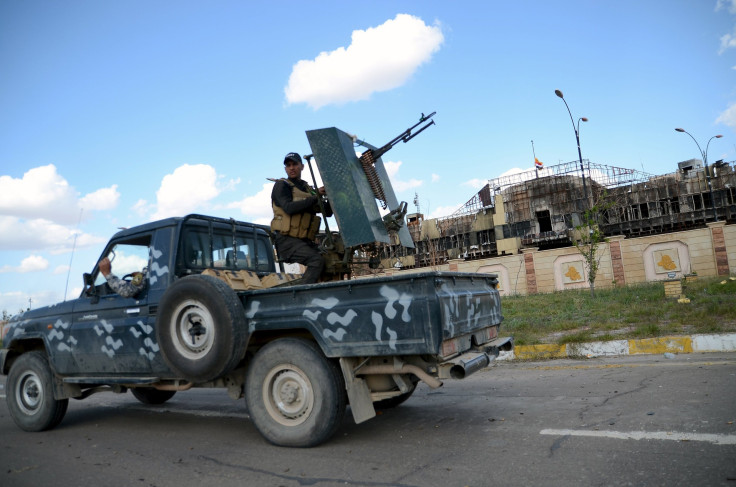Battle For Tikrit Signals Lack Of Unity In Iraqi Ranks, Trouble In Fight For Mosul

BAGHDAD -- The Iraqi government announced on Wednesday that the city of Tikrit had been liberated from the Islamic State group, but security forces and Shiite militias were still battling the Sunni militants as the day ended. The miscommunication, coming after weeks of mixed signals on when the assault on Tikrit would begin and who would be leading it, signals a worrying lack of coordination between the government and the men fighting on the frontlines -- something that does not bode well for the next big fight, the battle to retake Mosul, Iraq's second-biggest city.
The battle for Tikrit, a city just over 100 (165 km) miles north of Baghdad and the hometown of ousted dictator Saddam Hussein, has dragged on for nearly a month. The group also known as ISIS captured it in June. The assault on Tikrit is the first major offensive launched by the Iraqi forces to retake a city captured by ISIS.
But the offensive is not going as well as the Iraqi security forces had planned, according to interviews with Iraqi forces in Tikrit. The offensive was stalled not only because fighters were waiting for U.S. airstrikes on ISIS positions to begin, but also because of disagreements among Iraqi military leaders and Shiite militias on how to proceed. Those disagreements trickled down through the ranks of both the Iraqi security forces and Hashd al-Shabi, an umbrella group that includes several militias and is largely funded by Iranian money.
The soldiers of the Iraqi security forces heard that the battle was going to be intense and would last for weeks, but the volunteers of Hashd al-Shabi heard that the city was almost entirely liberated and that there was no need for urgency in wiping out the last isolated pockets of ISIS resistance.
The different notions of what was going to be needed on the battlefield helped lead to the attack being stalled for more than two weeks. That lack of coordination led in turn to the false report that Tikrit had been liberated completely from ISIS on Wednesday morning. The Iraqi security forces did make some progress: They moved into the center of the city and gained ground in two small neighborhoods. They did not actually liberate the entire city.
Iraqi TV showed Prime Minister Haider al Abadi parading through what reportedly was the center of Tikrit on Wednesday as he waved an Iraqi flag. The celebration came on the heels of an announcement by the defense minister, who said that the government's forces claimed a “magnificent victory” in the city. That news was spread across the country Wednesday morning. For hours in Baghdad, cars drove down one of the main streets honking their horns and blasting music in celebration.
But the footage of Abadi looks as though it was taken within the walls of Tikrit University, an area that has been secured as long as two weeks ago by members of Hashd al-Shabi, also known as the Popular Mobilization Committee. The center of the city is almost a mile away, and Iraqi forces and Islamic State group militants were still battling there on Wednesday.
Members of the Iraqi security forces, who asked to remain anonymous because they were not authorized to speak on the matter, said that they were the ones leading the battle, not Hashd al-Shabi, though one source said there was some coordination. They said there were perhaps still hundreds of ISIS militants in the city, while members of Hashd al-Shabi said Tuesday that they were almost done with the battle.
What's happening in Tikrit also indicates fragmentation within the Iraqi ranks, which include both the regular army, and police, equipped by the U.S., and volunteers who are mostly Shiite. The battalions of Hashd al-Shabi fight separately and different uniforms, logos, vehicles and weapons, often supplied by Iran. Loyalties lie with the leaders of each individual battalion, not the larger umbrella force, or the nation of Iraq.
"There is some disagreement among the leaders in Hashd al-Shabi," Shirwan al-Waili, former Iraqi security minister, said in an interview in Baghdad. "The mission should have been finished by now."
That kind of fragmentation exists elsewhere, too.
The police in Anbar, a Sunni-majority province, are leading the fight against ISIS by recruiting locals to fight on the front lines. Anbar is a major battleground in the war against the terrorist group, but instead of the Iraqi military taking charge, the local tribes are largely left to run the fight themselves, because of sectarian mistrust.
The Sunni brigades have restricted access to the battlefield, to keep out the Iranian-backed Shiite militias. They are heading into battle almost entirely on their own. Long-standing distrust between the tribes and the Shiite-dominated military prevents the two from working together, tribal leaders said in interviews, although there have been cases of successful cooperation.
The distrust is also hampering the relationship with the U.S.-led coalition that's bombing ISIS from the air in order to soften the target for the ground offensives. Last week the Iraqi government asked the U.S. to conduct airstrikes in Tikrit, to clear the ground of explosive devices and open a path into the city.
"The Iraqi army was in constant contact with the U.S. during that time about where to strike," Shirwan said. But the airstrikes angered many of the Shiite militiamen, most of who claimed that the U.S. intruding on the fight.
"We needed the U.S. to come in because we did not have the planes or the intelligence to do it," said Waili al-Hili, an advisor to Prime Minister Hader al-Abadi. "We continue to work on keeping a good relationship with the U.S."
And while the Iraqi security forces and the U.S.-led coalition are now in the midst of planning assaults in Anbar and Mosul, it is not clear when they will take place -- nor how much Hashd al-Shabi will be involved.
© Copyright IBTimes 2024. All rights reserved.





















